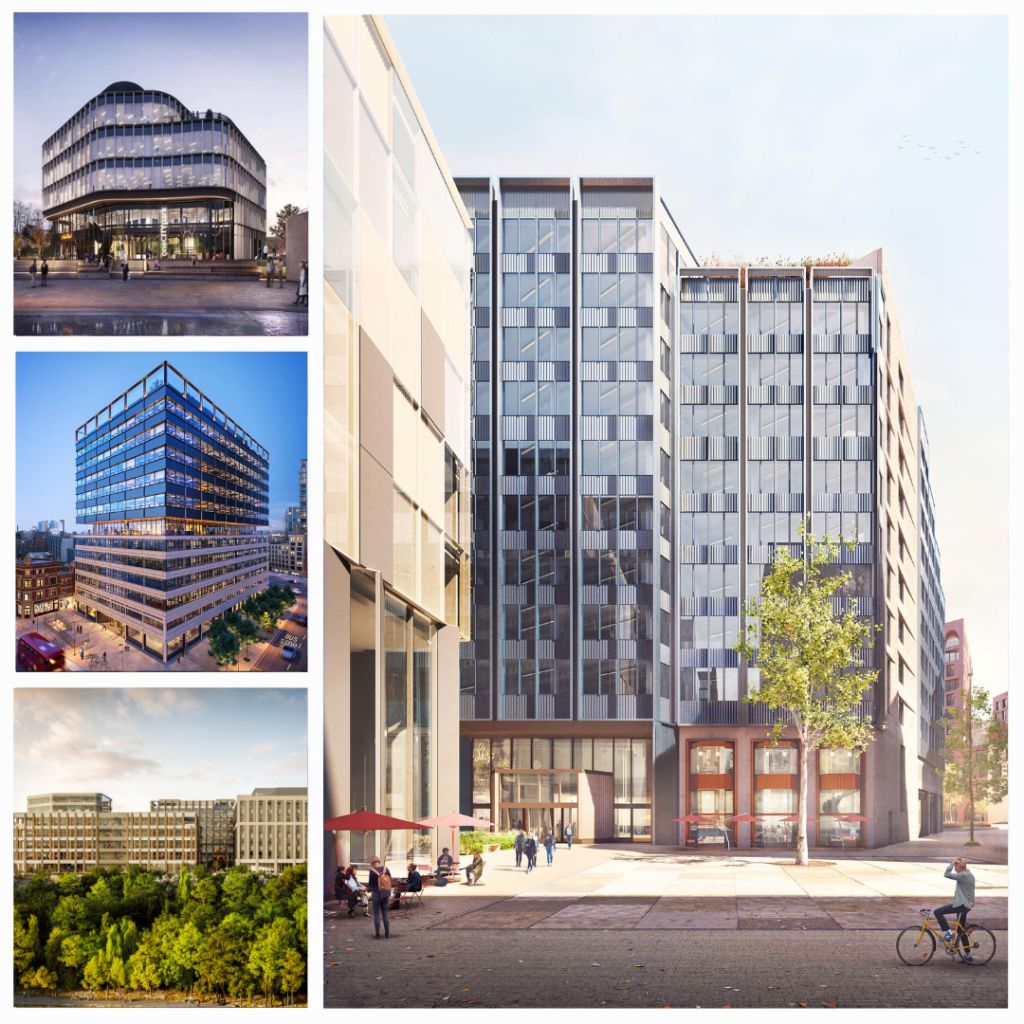Social value of office architecture
Architects are able to influence positive change to drive long term transformation. This article looks at how office architecture uplifts communities by adding social value to commercial buildings.
As Churchill put it, “We shape our buildings and afterwards our buildings shape us”.
Office architecture is evolving to embed social value at the outset. This benefits the local community, employee wellbeing and the environment.
7 ways office architecture can add social value
1 Offices as part of urban regeneration
Beautiful office architecture instantly boosts the appearance of an area and it can contribute towards urban renewal and economic advancement. Grade A offices with iconic architecture attract more businesses to work in the area. It creates more jobs and provides incentivisation for reinvestment into the local communities.
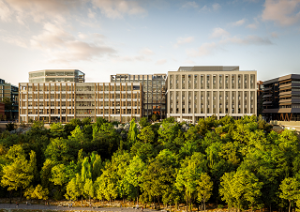
We supplied the 1625 tonne structural steelwork package for the new ‘Maker And Faber’ buildings in Sunderland.
“Maker and Faber, two new state of the art office spaces at the heart of the Riverside Sunderland masterplan area, will play a significant role in rejuvenating an iconic yet neglected site located in the city centre. This will enhance Sunderland’s developing cityscape, providing a contemporary and vibrant new urban quarter on the historic banks of the River Wear.”
Adam Fryett, Project Architect, Ryder Architecture.
2 Outdoor office space boosts employee wellbeing
With a focus on mental wellbeing and encouraging positive productivity, external workspaces are becoming highly sought after. Gardens and roof terraces give employees the opportunity to relax, eat and interact with other employees.
3 Biophilic office designs
Living walls provide a biophilic design to offices that don’t have outdoor spaces. These walls can reduce noise and improve the air quality and enhance the interior design in an office space. The evapotranspiration helps to gain more LEED certification points for your commercial development. According to WELL Building Standard, research showed 87% of employees want their office to offer healthier workspace benefits.
4 Green roofs help biodiversity
Green roofs are proven to improve biodiversity and air quality. They retain heat in the building, whilst the natural evaporation of water from the plants and soil helps to cool and humidify the air, lowering the ambient temperature.
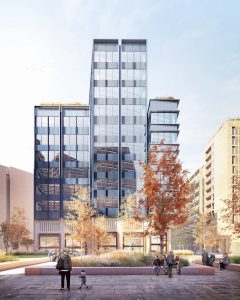
We supplied the structural steelwork for One Keskidee Square, a 26,000m2 office building as part of the King’s Cross development.
Designed by AHMM and Bennetts Associates, the office development is broken into three distinct blocks. The lower parts have sedum roofs that will be overlooked from the higher floors. The roof’s sustainability benefits contributed towards the building’s rating in BREEAM/LEED and other sustainable design assessment systems.
5 Designing renewable energy into the building envelope
We supplied the 518 tonne structural steel package for One City Park in Bradford, which is raising the bar for Grade A offices. The architect incorporated renewable energy into the building envelope, including Photovoltaic (PV) panels, a type of window that allows natural daylight to come into the building, whilst turning solar energy into electricity. One City Park architecture also integrates heat pumps, bicycle storage, and EV charging points into the design to reduce carbon emissions.
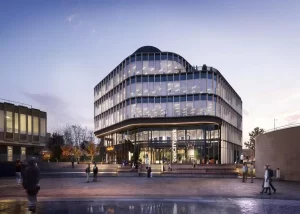
As part of a shared regeneration goal, One City Park will provide Bradford with a state-of-the-art Grade A office building with iconic architecture in a superb location. Designed by Sheppard Robson architects, the roof terrace and high-tech glazing emphasises the shape of the building, making the most of natural daylight and the view overlooking ‘mirror pool’, a popular water feature in the heart of Bradford city centre. The striking steel and glass façade with enhance the look of the area is set to attract burgeoning local business as well as national and international names.
6 Maximise natural daylight to boost employee wellbeing
A study by Dr Hedge found that designing office buildings with maximum natural light boosts employee wellbeing. The study found it can decrease eye strain, headaches and drowsiness.
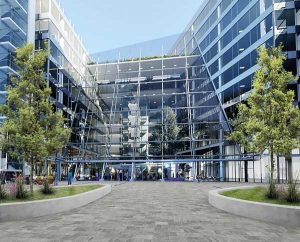
Central Square in Leeds has a BREEAM outstanding rating for sustainability. Designed by DLA Architecture, it has a beautiful 7-storey atrium encasing it’s ‘winter garden’ relaxation area, which maximises the daylight into the office building.
We provided the structural steelwork, including five 27m long tubular vertical bowstring trusses that carry the deadload from the atrium glazing, whilst supporting a balcony in the ‘Sky Garden’ that overlooks Leeds City Centre.
7 Reimagining existing buildings
Reinventing an existing building to modernize its appearance helps to reduce its carbon footprint, by reusing some of the building materials. Our article ‘retrofitting existing building stock’ shows how retrofitting makes a building more efficient and delivers long lasting benefits.
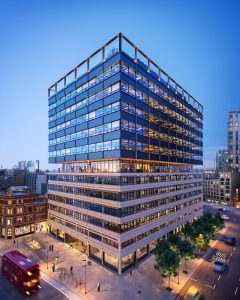
The Rowe Office building, formerly known as Central House, is a great example of how architecture can reimagine existing structures. Designed by James Smith from AHMM the office building architecture was inspired by Rachel Whiteread’s Fourth Plinth.
A playful piece of art by Yinka Ilori is visible from the street. It creates a visual break to emphasise the old and new parts of the building. All floors have an outdoor space and the artwork on this level creates a vibrant breakout area. Despite being in the busy Whitechapel area, there is 17,300 sq ft of outdoor space incorporated into the design, that’s the equivalent of over eight tennis courts. The Rowe is targeting WELL Platinum Certification.
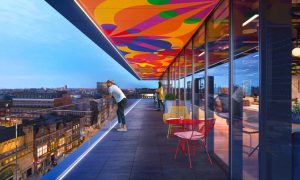
We added 6 new floors of steelwork onto the top of the 6-storey concrete structure. We worked closely with Robert Bird Group who were responsible for third party monitoring. This included analysing the ground conditions to give insight into the early foundation design decisions. Our contracts team had to carefully plan the logistics because the construction took place within the footprint of the building. Read the Central House Case Study to learn more about this hybrid construction project and how we achieved an outstanding NPS score for our project performance.
For more news, subscribe to our newsletter

